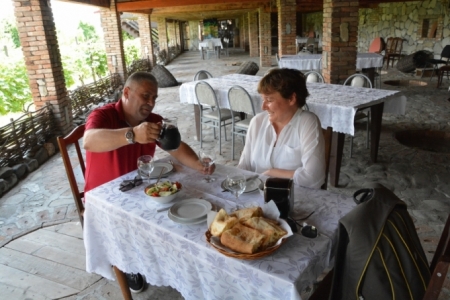
Not so long ago, we have come across a very impressive report on Georgian wine , written by a German journalist Andrea Rehmsmeier and several of her colleagues, published by the Deutschlandfunk outlet. The report focused on our wine’s properties and perspectives in today’s rapidly changing geopolitical and economic climate, accompanied by some very touching accounts of its degustation during the reporters’ visit to Georgia. Immediately intrigued, we contacted Andrea herself for an interview, and she graciously accepted.
– Ms. Rehmsmeier, you can begin by sharing some details about yourself, your work, your activities and plans for the future with us.
– I work as a freelance journalist in Hanover, the capital of Lower Saxony. I was born in Western Germany, but I speak Russian thanks to attending Slavic studies in the post-perestroika years. Back then, many young people from Western Germany were searching for possibilities to experience the countries behind the former Iron Curtain. I used to work as a German language teacher in Novgorod, and I also studied in Minsk for a year. Since then I am traveling to Russia and other Eastern European and Central Asian countries, writing reports on their various aspects and fields to later publish them on German national radio and several printed media outlets.
– What connects you to Georgia?
– Both my colleagues and friends who visited Georgia before recall their experiences there with great enthusiasm. I have always been fascinated by the multiethnic and multilingual Caucasian society; my desire to visit Georgia dates many years back. However, my fellow radio reporter worked there, so the spot was occupied. Thus, I managed to visit Georgia for the first time only in this year’s summer.
– Why did you decide to write a report on a topic as specific as Georgian wine?
– Even in Germany, wine is known as a typical Georgian product. Despite that, there still exists a stereotype of wine from Georgia being a semi-sweet and cheap beverage, not unlike the wines that were sold in the former Soviet Union,
with taste very different from the dry wines that Western Europeans generally prefer. But after the beginning of the EU Association process, Georgian restaurants were opened in many German towns, and the customers quickly found out that many of your wines are dry and very, very tasty – and not cheap at all!
– Do you think that Georgian wine can compete with the titans such as France, Italy and Germany at the European market?
– High quality wines from Georgia sure can. Here in Hanover we like to drink them at a local Georgian restaurant, and during a visit to Kakheti we indulged in them with great pleasure. Surprisingly, even though the quantity we consumed was remarkable, none of us came to regret it on the following day. Although I have to admit that the taste of traditional kvevri wine is something you have to get used to.
Pricing your wine properly might be a problem, however. Competition in our discount stores’ wine segments is simply ruinous - one can find cheap white wine there for as little as 3 euros. And names of Georgian wines are complicated to pronounce and remember for us, so your producers are going to need a special marketing strategy if they want to make it.
– What do the German people think of Georgia in general?
– For many years Georgia was perceived as a typical post-Soviet crisis-ridden state. But this image is changing rapidly, since more and more people think about spending their holidays in Georgia. First it was the backpackers who spread the news about decent tourist infrastructure there, and now first families are starting to take interest. Even though Georgia currently is somewhat of an insider tip among tourists, I wouldn’t be astonished if it becomes far more popular over the next five years.
– Are there any Georgian-made products on the shelves of German supermarkets at the moment?
– I have heard about a remarkable amount of nuts from Georgia being sold in Western European discount stores. But since they are not labeled as such, people don’t take notice. However, quite a few Georgian restaurants and gourmet food shops popped up in all big and even middle-sized towns in the last two or three years. For Germans with no special interest, these represent the first window to Georgia.
Author: Zura Amiranashvili
v-if="article.gallery" v-html="article.gallery"
(adsbygoogle = window.adsbygoogle || []).push({});